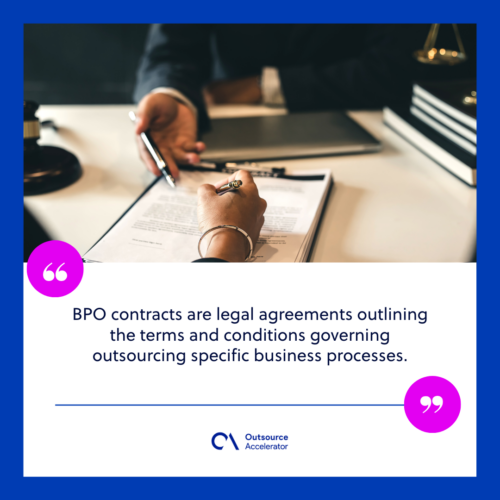BPO contracts: Everything you need to know

A strong business partnership is further strengthened by a legal bind that forges security and trustworthiness.
Without legal binding, a business deal may pose dangers that can significantly impact the success and sustainability of the collaboration. One of the primary risks is the increased likelihood of misunderstandings and disputes, as there is no documented agreement on roles.
A well-defined partnership contract is crucial for meticulously outlining requirements and establishing a robust foundation for expected services. This is particularly pertinent in industries with extensive collaboration processes, such as business process outsourcing (BPO).
In this article, we’ll delve into BPO contracts, understanding their types, the risks of not following them, and tips for effective negotiations.
We’ll also highlight the critical role contracts play in safeguarding the interests of business partnerships.
What is a BPO contract?
BPO contracts are legal agreements outlining the terms and conditions governing outsourcing specific business processes. It solidifies the partnership between a business and its service provider.
These contracts guide the collaborative efforts toward success by explicitly defining each party’s roles, responsibilities, and expectations.
Furthermore, BPO contracts safeguard the client and service provider’s interests and set the stage for effective communication and seamless coordination.

4 types of BPO contracts
There are four types of BPO contracts, each with its respective applications depending on the service being outsourced:
1. Time and materials contract
The Time and Materials (T&M contract) operates on the principle of actual time spent and materials used while outsourcing tasks.
This is one of the most advantageous BPO contracts for projects with evolving requirements.
In this arrangement, the client pays for the hours dedicated to the project and the resources utilized, ensuring a transparent and adjustable framework.
For instance, in software development, where project scopes may evolve as the development progresses, the T&M contract offers the flexibility needed to accommodate changes. It ensures that the client pays for the actual effort invested.
2. Fixed price contract
Among the commonly used BPO contracts is the Fixed Price agreement, which establishes a predetermined amount for the outsourced services. This model provides cost certainty for the client, facilitating easier budgeting for the outsourcing project.
Take note that this contract model may pose some challenges. The complexity lies in the potential for changes or expansions beyond the initially agreed-upon scope, which may result in additional costs.
For example, a Fixed Price contract has a defined exact cost if the scope of services is well-defined. But if the client later requests additional promotional materials or expands the campaign’s reach, the fixed cost might need renegotiation to account for the expanded scope.
3. Dynamic Systems Development Method (DSDM)
Dynamic Systems Development Method (DSDM) BPO contracts display flexibility and adaptability in the outsourcing landscape.
Unlike contracts with a fixed scope, DSDM allows for dynamic adjustments in the scope of work, accommodating changes driven by evolving business needs.
An example is software development projects where requirements may evolve during the development lifecycle. A DSDM contract empowers both the client and the service provider to adjust to the requirements.
This adaptability ensures that the final deliverables align closely with the current business environment.
4. Pain share/gain share
Pain share/gain share contracts usher in a unique collaborative dimension to the outsourcing relationship. This agreement promotes a shared responsibility for project outcomes.
By tying the payment structure to predefined performance metrics, these contracts align the interests of the client and service providers’ interests.
If the outsourcing partner exceeds expectations, both parties share the gains, fostering a sense of a “win-win outcome.” Conversely, if performance falls short, both entities share the associated pain, incentivizing a collective effort to overcome challenges.
Importance of a BPO contract
BPO contracts are the fundamental building blocks of successful partnerships between businesses and service providers.
These contracts clarify the roles and responsibilities of each party involved by meticulously outlining the terms, conditions, and expectations of outsourcing specific business processes.
This clarity is crucial for the following professional measures:
- Preventing misunderstandings
- Aligning objectives
- Establishing a robust foundation for collaboration
Additionally, BPO contracts act as indispensable risk management tools. They offer protection for both parties, ensuring that the interests of the client and the service provider are safeguarded.

Risks of not following BPO contracts
Failure to adhere to BPO contracts can lead to a myriad of risks, including:
- Quality issues – Without a clear agreement, there is a higher likelihood of misunderstandings regarding quality standards, leading to subpar outcomes.
- Scope creep – Lack of a defined scope in the contract can result in scope creep, where the project expands beyond its initial boundaries, causing delays and additional costs.
- Legal implications – Ignoring the terms of BPO contracts can have legal consequences, potentially leading to disputes and damage to business relationships.
- Financial loss – Without BPO contracts, financial implications may become unpredictable, causing financial strain on both parties.
Key elements of BPO contracts
To ensure the effectiveness of BPO contracts, they should include the following key elements below:
Scope of work
Outlining the scope of work is crucial to avoid misunderstandings between the outsourcing company and the service provider.
This section should describe the tasks, responsibilities, and deliverables expected from both parties. It helps set clear expectations and prevents potential disputes regarding the responsibilities of each party.
Service level agreements (SLAs)
Establishing measurable performance metrics and service levels to ensure accountability and quality assurance is vital to the success of any business partnership. SLAs are essential for establishing measurable performance metrics and service levels.
Key performance indicators (KPIs) relevant to the outsourced tasks must be clearly defined. They may cover response times, resolution times, and other performance benchmarks.
Payment terms
The payment terms section should clearly outline the financial aspects of the contract. This section should include:
- Payment structure
- Project milestones
- Invoicing procedures
Specifying the currency, payment frequency, and applicable taxes is equally important in this part of the contract.
This may also include penalties for late payments or incentives tied to exceptional performance, providing a financial framework that aligns with the agreed-upon terms.
Confidentiality and security
BPO contracts often involve handling sensitive information. This section addresses data protection and confidentiality concerns.
It should define the types of data considered confidential. It must outline security measures to protect data and establish procedures for handling, storing, and transmitting sensitive information.
Compliance with relevant data protection laws and regulations should be emphasized.
Dispute resolution
The contract should include a dispute resolution mechanism to mitigate potential conflicts. This could involve negotiation, mediation, or arbitration.
Clearly defining the steps and procedures for dispute resolution helps resolve issues efficiently without resorting to lengthy and costly legal proceedings.
Termination clause
The termination clause discusses the conditions in which either party has the authority to conclude the contract. It may include breaches of contract, failure to meet SLAs, or other specified circumstances.
The following consequences of termination should also be detailed:
- Transition plans
- Handover of assets or data
- Associated penalties or fees
A well-drafted termination clause protects the interests of both parties and provides a roadmap for an orderly conclusion to the outsourcing relationship.
Tips in negotiating BPO contracts
Negotiating BPO contracts requires a strategic approach. Here are some tips to ensure a mutually beneficial agreement:
- Clearly define your expectations and deliverables. Avoid assumptions and ensure both parties have a shared understanding of the scope and objectives.
- Negotiate transparent pricing structures. Understand all cost components and potential additional charges and seek flexibility for adjustments based on business needs.
- Specify acceptable service levels, response times, and penalties for non-compliance to safeguard your business interests.
- Build flexibility into the contract to accommodate business growth or fluctuations in demand. Negotiate terms that allow for scalability without incurring excessive costs.
- Define robust security measures and confidentiality provisions to protect sensitive information, ensuring compliance with industry standards and regulations.

- Include clear and fair termination clauses. Detail conditions for early termination, transition processes, and any associated penalties or benefits for both parties.
- Ensure the contract aligns with local and international laws. Address compliance with regulations related to data protection, labor, and any industry-specific requirements.
- Establish a framework for regular performance reviews. Outline evaluation criteria, frequency, and mechanisms for addressing and improving performance issues.
- Include a detailed dispute resolution mechanism. To streamline conflict resolution, specify resolution procedures, escalation paths, and mediation or arbitration processes.
- Enumerate the contract duration and renewal terms. Discuss options for contract extension, renegotiation, or termination, clarifying the seamless transition process.
- Include provisions for benchmarking services against industry standards. This ensures that you receive competitive and high-quality services throughout the contract duration.
- Address insurance requirements and indemnity clauses. Clearly outline responsibilities for insurance coverage and establish indemnification terms to manage risks effectively.
How BPO contracts protect business partnerships
BPO contracts play a vital protective role in business partnerships by creating a framework that nurtures trust, accountability, and mutual success.
These contracts establish a foundation of clarity by explicitly defining the scope of work, service level agreements, and payment terms. They also minimize the risk of disputes between the outsourcing company and the service provider.
Moreover, BPO contracts are dynamic tools that promote adaptability in evolving organizational landscapes.
As the business environment changes, these contracts provide a mechanism for adjusting the terms and conditions to ensure continued alignment with the partners’ goals.







 Independent
Independent




